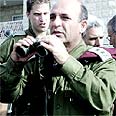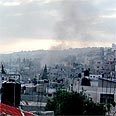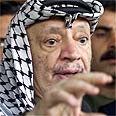


Mofaz: Army crushed suicide terrorism in 2nd intifada
In special Ynet interview marking decade since outbreak of al-Aqsa Intifada, then-IDF chief says targeted killings aimed at quelling suicide terror were morally justified. 'We targeted ticking bombs,' he says; admits 'serious mistakes' were made during incident in which soldier bled to death in battle at Joseph's Tomb
Knesset Member Shaul Mofaz (Kadima), who served as the Israel Defense Forces chief of staff during the outbreak of the second intifada a decade ago, said the army was aware at the time it was facing a "new pattern of terror."
"Thousands of terrorists were arrested, but even if you got your hands on 90% of them, the remaining 10% managed to explode on buses," he tells Ynet in a special interview, published Friday.
"We won in the end. Terror still exists at varying levels, but it is related to the diplomatic negotiations," says Mofaz, who is also a former defense minister.
"I am proud of that era, although it was difficult. I took part in five wars, but (the second intifada) was the most difficult time I had ever experienced. If there is one thing I regret, it's that we were not able to save more lives. More than 1,000 people were killed, and I regret not having ended (the uprising) sooner," he says.
Mofaz says that according to information obtained by the IDF, in February 2001 then-Palestinian leader Yasser Arafat asked the heads of the Palestinian security apparatuses why there were many more Palestinian versus Jewish fatalities.
"Arafat told them, 'You know what to do,' and that is when the whole suicide bombers issue began. Not that there weren't suicide bombers before, but during this period there were two a day, four a week," the Kadima MK recalls.
Mofaz claims that a year before the second intifada erupted, IDF intelligence said it expects an outbreak of Palestinian riots that will include live fire, terror and bombs. "No one had spoken of suicide bombings yet," he says.
According to the former chief of staff, Ehud Barak, who served then as defense minister, denied his request for a NIS 600 million ($165 million) budget increase to prepare the army. "They told me, 'We are going to Camp David, to an agreement; what outbreaks are you talking about?' We managed to garner the money from the IDF's budget; we trained the soldiers and drafted operational plans," says Mofaz.

Palestinians at Joseph's Tomb following the battle (archive photo: AP)
More than a year after Arafat convened his security chiefs, a suicide bomber detonated himself on Passover Eve in Netanya's Park Hotel, killing 29 people and injuring some 140 more. Mofaz recalls a conversation with then-Prime Minister Ariel Sharon after the attack. "He told me, 'It's a difficult day,' and I replied, 'It can't go on like this.' He asked me what I meant, and I said we must do something different, on a different scale to stop the suicide terrorism. We must enter all the Palestinian cities and refugee camps and crush the terror infrastructures, create a new reality.
"I told (Sharon) that we must call up the reserves because the regular forces don’t know how to do it. We had to operate in residential and rural areas while continuing to protect our borders. We called up some 40,000 reserve soldiers," says Mofaz.
According to Mofaz, Operation Defensive Shield, launched by the IDF in 2002, "broke suicide terrorism. It made them stop wanting to send out suicide bombers."
The effort to quash suicide terrorism led to targeted killings. "During the operation we reached the conclusion that in addition to arresting and killing terrorists, we needed to reach the terror leaders. All of them. We did our best to minimize civilian casualties," he says.
Asked about the moral aspect of the targeted killings, Mofaz says, "Do we have the legitimacy to harm murderers, people who we know are going to send terrorists or blow themselves up in an hour and leave dozens of casualties? The question is whether or not you stop a ticking bomb.

'Most difficult time.' Mofaz during second intifada (archive photo: IDF Spokesperson's Unit)
"Eventually we found the targeted killing to be legitimate. On numerous occasions we called off operations because the chances of civilian casualties were high. The terrorists chose to use civilians as a shield. We had no choice," he adds.
Mofaz says the decision to kill Hamas spiritual leader Sheikh Ahmed Yassin was also justified. "We decided to take him out because he decided to use all the means at his disposal to kill Israelis. In the West Bank, the targeted killings were successful, and by the end of 2002 the suicide attacks were reduced to a minimum. Then the attacks from Gaza began. At some point, Yassin allowed women to go on suicide bombing missions as well.
"There was a debate surrounding the decision to kill him. He was a symbol, and we wondered whether killing him would escalate or subdue the confrontation. Eventually, it helped diminish the violence," according to the MK.
A decade later, Mofaz does not detect a desire for violent struggle among the current Palestinian leadership, but does not rule out the possibility of "deterioration."
"I don’t think (any confrontation) will be similar to the suicide bombings (of the second intifada), because Palestinian society, as well as its leadership, understands that the path of violence and terror won't work. Israeli society and its army are strong. They don’t have a chance. I think Hamas and Islamic Jihad realize this as well," he says.
There have been changes in Israeli society as well. People want peace and quiet. Perhaps we've grown weary?
"Society understands the price of war and confrontation, and realizes that the time has come for negotiations. Most Palestinians do not want a confrontation. They understand that an agreement would benefit them just as much. They can get a Palestinian state. On the Israeli side, beside the desire for peace, we do not want to be occupiers."
Addressing the October 1, 2000 death of Druze soldier Madhat Yousef, who was shot by a Palestinian sniper during a battle at Joseph's Tomb in Nablus and was not evacuated for hours until he died of his wounds, Mofaz says, "Some serious mistakes were made during this incident. The army was prepared to launch a rescue mission; soldiers were positioned only a few kilometers away. The political echelon asked the army to wait because the Palestinians said they would evacuate him from the site. By the time I arrived at the scene, it was already too late."
- Follow Ynetnews on Facebook















